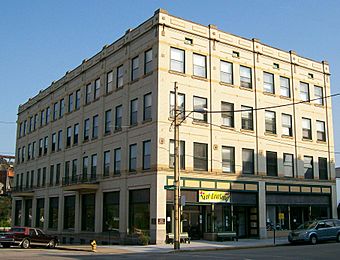Zweig Building facts for kids
Quick facts for kids |
|
|
Zweig Building
|
|

Front and side
|
|
| Location | 3396 Belmont St., Bellaire, Ohio |
|---|---|
| Area | Less than 1 acre (0.40 ha) |
| Built | 1912 |
| Architectural style | Early Commercial |
| NRHP reference No. | 00000018 |
| Added to NRHP | January 28, 2000 |
The Zweig Building is a special old building in downtown Bellaire, Ohio. It was built in 1912. This makes it a great example of an early type of building design called the Chicago school.
The building is made of brick and has a strong stone base. It has four floors. On the outside, you can see tall, flat columns called pilasters that separate the windows. The first floor has big glass windows, perfect for shops. In the past, small businesses like dentists and jewelers used to be here.
A Look at Its Design
The Zweig Building is special because it still looks much like it did when it was first built. Many other old buildings in Bellaire have changed a lot or are gone. But the Zweig Building still has its original features.
For example, it has unique prism-like windows above the main display windows. These are called transom lights. Inside, you can find original metal ceilings and wooden floors. These details show how well the building has been kept over the years.
Saving History
Because the Zweig Building has kept its original look so well, it was added to the National Register of Historic Places in the year 2000. This list helps protect important historical places in the United States.
The Zweig Building is one of five places in Bellaire that are on this special list. Other places include the Imperial Glass Company, a house called Belleview Heights, part of the B & O Railroad Viaduct (a bridge over the Ohio River), and the Donald B. towboat.
In 2001, the building got more than $2.2 million to help fix it up. This money came from special tax credits for saving historic buildings. The owners, Bellaire Housing Partners, used the money to turn the Zweig Building into apartments for older people. This project is called adaptive reuse, which means giving an old building a new purpose while keeping its history.
The Ohio Historical Society even praised the group for doing such a good job. They were happy that the building's original design was kept during the renovation.



